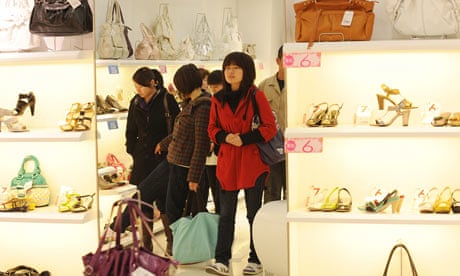China's role as the engine of world trade and chief rival to the US was cemented yesterday after its economic performance in 2010 powered it to second place in the global rankings ahead of Japan.
The Chinese economy grew by 10.3% last year, in sharp contrast to Japan, which has struggled to grow by more than 2% a year for the last two decades.
The stronger than expected data from China sent stock markets and the price of commodities falling as traders wrestled with the implications for growth and inflation in the rest of the world.
Fuelled by recent high oil prices, inflation in China also came in higher than expected last month, at 4.6%. Worries over inflation were underlined by news that Guangdong province, China's southern manufacturing heartland, had increased its minimum wage by 18%–26%,the second big rise in less than 12 months.
Oil prices dived on fears that Beijing would need to calm its booming home market in the coming months, while the Shanghai exchange fell 3% on concerns that the authorities would be forced to raise interest rates. The FTSE 100 led a downward march on European and US exchanges, finishing down 108.79 at 5867.91, a fall of almost 2%, and taking its two-day decline to almost 200 points.
Analysts at Lombard Street Research said that the risk of China's economy overheating had worsened significantly in the fourth quarter as both domestic demand and export growth surged.
"Policymakers are behind the curve and need to act decisively if they are to curb inflation. The longer growth stays above trend, the worse the necessary downswing is set to be," said Lombard Street's Diana Choyleva. "China's violent cycle could be highly destabilising for the world. Over the next 12 to 18 months, China is set to pay the 'growth price' of its excessive policy stimulus." She said Beijing had engineered an unprecedented expansion in response to the 2008 recession. "But … monetary and fiscal ease did more to accelerate inflation than to achieve a sustainable boost to growth."
Two other analysts, Capital Economics and Evolution Securities, were more sanguine. Capital said the inflationary effects of the stimulus package were waning and that the economy would calm down. A steady exchange rate and declining internal demand would also keep inflation in check, it believed.
In Washington, President Obama told his Chinese counterpart Hu Jintao, who is on a four-day state visit, that the US would like to see China's currency, the yuan, rise in value to reflect the economy's success. Obama told a press conference that even though China had taken some steps to strengthen its currency, it remains undervalued.
Hu indicated that Beijing was committed to letting market forces influence the yuan's value, Obama said, but "not as fast as we'd like".
Obama is concerned that American companies are struggling to recover from recession while Chinese goods remain artificially under-priced. He is keen that the yuan be allowed to rise, which would have the effect of making imports to the US more expensive and US exports cheaper for Chinese consumers.
European governments are more wary of pushing China down this road, as, unlike the US, they are worried about rising inflation, and more expensive Chinese imports would only make the situation worse. The Bank of England has come under pressure to raise rates following a rise in UK inflation this week to 3.7%, and the European Central Bank has already threatened to raise interest rates to calm inflation in the eurozone.
Figures yesterday showed that consumer confidence across Europe had slipped for a second month, adding to fears that recovery was under threat across the continent, except in Germany, which has boomed on the back of exports to Asia.
A CBI survey of British manufacturers found many sounding a warning about further inflationary pressure. The number of manufacturers that had put their prices up over the past three months hit its highest level since October 2008, according to the survey.
Oil prices fell to near $90 a barrel, after almost reaching $100 this week, because of the fear that Beijing will be forced to implement higher taxes or lending constraints to calm growth. China is the world's largest importer after the US and its economic performance is regarded as a crucial factor in determining the demand for oil.
China's 4.6% inflation in December was better than the 28-month high of the November figure, but analysts said it was still worse than expected and remained likely to rise again.

Comments (…)
Sign in or create your Guardian account to join the discussion